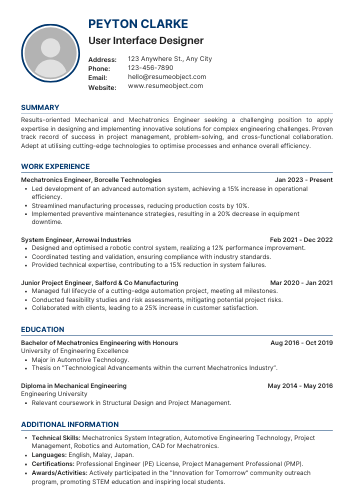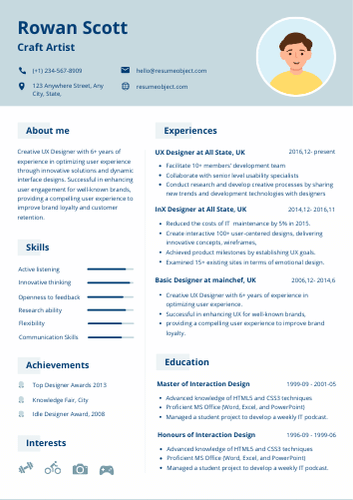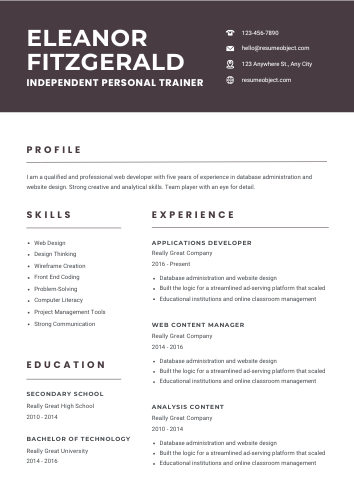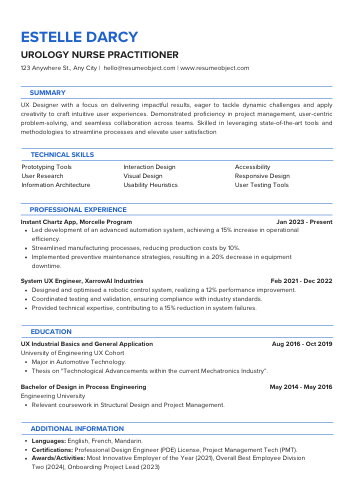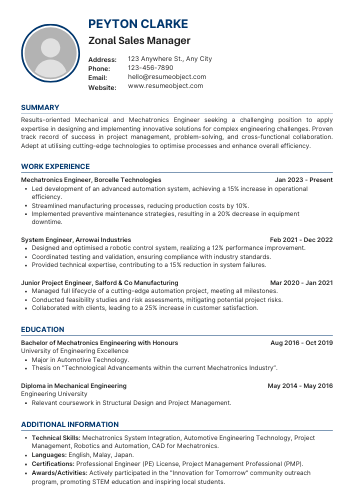Instrument Designer Resume
In the competitive field of instrument design, a standout resume template is essential for showcasing your skills and experience. An effective sample format can help you highlight your technical expertise, creativity, and problem-solving abilities, making a lasting impression on potential employers.
Crafting a professional instrument designer resume requires attention to detail and a clear presentation of your qualifications. Utilizing a well-structured resume template ensures that your sample format effectively communicates your strengths and aligns with industry standards, increasing your chances of landing your dream job.
Instrument Designer Resume Objective Statement Examples
Explore effective resume objective examples for instrument designers, showcasing skills, experience, and career goals to capture employer attention and highlight your unique qualifications in the competitive job market.
-
Detail-oriented Instrument Designer with over 5 years of experience seeking to leverage expertise in designing and implementing instrumentation systems to enhance operational efficiency at [Company Name].
-
Innovative Instrument Designer aiming to contribute advanced design skills and strong analytical abilities to [Company Name], driving the development of cutting-edge instrumentation solutions.
-
Results-driven Instrument Designer with a proven track record in project management and technical documentation, looking to join [Company Name] to optimize design processes and improve project outcomes.
-
Passionate Instrument Designer with a focus on sustainable design practices, seeking to apply my skills in [specific software or technology] at [Company Name] to create environmentally friendly instrumentation solutions.
-
Versatile Instrument Designer with strong collaboration skills, eager to support cross-functional teams at [Company Name] in delivering high-quality instrumentation designs that meet client specifications and industry standards.
Discover how to effectively showcase your skills and experience in the humanitarian field. Craft a compelling application that stands out with our comprehensive guide on creating a Humanitarian Resume.
Example Summary for Instrument Designer Resume
Discover an effective resume summary tailored for Instrument Designers, highlighting key skills, relevant experience, and industry expertise to capture employer attention and enhance job application success.
Detail-oriented and motivated Instrument Designer with a strong foundation in instrumentation and control systems. Proficient in CAD software and design principles, with hands-on experience in creating detailed schematics and specifications. Adept at collaborating with cross-functional teams to deliver innovative solutions that meet project requirements. Committed to continuous learning and applying industry best practices to enhance design efficiency and accuracy. Ready to contribute technical expertise and a fresh perspective to drive project success in a dynamic engineering environment.
Detail-oriented Instrument Designer with over 5 years of experience in designing and developing instrumentation systems for industrial applications. Proficient in utilizing AutoCAD and other design software to create precise technical drawings and specifications. Strong background in collaborating with engineering teams to ensure compliance with industry standards and project requirements. Proven ability to troubleshoot and optimize instrumentation solutions, resulting in improved efficiency and reduced costs. Seeking to leverage expertise in a challenging role to contribute to innovative projects and drive operational excellence.
Results-driven Instrument Designer with over 10 years of experience in designing, developing, and implementing instrumentation systems for various industries, including oil and gas, pharmaceuticals, and manufacturing. Proven expertise in utilizing advanced design software and tools to create innovative solutions that enhance efficiency and safety. Strong background in collaborating with cross-functional teams to deliver projects on time and within budget. Committed to continuous improvement and staying updated with industry trends and technologies. Adept at translating complex technical requirements into practical designs that meet client specifications and regulatory standards. Seeking to leverage my extensive experience and technical skills to contribute to a forward-thinking organization.
Similar Resumes
Key Job Duties & Responsibilities of Instrument Designer
Instrument Designers create and develop instrumentation systems, ensuring optimal performance and compliance with industry standards while collaborating with engineers and stakeholders to enhance project efficiency and effectiveness.
-
Design Instrumentation Systems: Develop detailed designs for instrumentation systems, ensuring they meet project specifications and industry standards.
-
Create Technical Drawings: Produce accurate technical drawings and schematics using CAD software, illustrating instrumentation layouts and connections.
-
Select Instruments: Evaluate and select appropriate instruments and equipment based on project requirements, ensuring compatibility and efficiency.
-
Conduct Calculations: Perform necessary calculations for process control, including flow rates, pressure drops, and temperature changes, to ensure optimal performance.
-
Collaborate with Engineers: Work closely with process and mechanical engineers to integrate instrumentation into overall system designs, ensuring seamless functionality.
-
Prepare Specifications: Draft and maintain instrumentation specifications and datasheets, detailing performance criteria and operational parameters.
-
Review and Approve Designs: Review designs and specifications from vendors and subcontractors, ensuring compliance with project standards and requirements.
-
Participate in Project Meetings: Attend project meetings to discuss design progress, address challenges, and ensure alignment with project timelines.
-
Conduct Site Surveys: Perform site surveys to assess conditions and requirements for the installation of instrumentation systems.
-
Support Installation and Commissioning: Provide technical support during the installation and commissioning phases, ensuring that systems are correctly implemented and operational.
-
Troubleshoot Issues: Identify and resolve instrumentation-related issues during the project lifecycle, providing solutions to maintain project schedules.
-
Maintain Documentation: Ensure all design documentation is up-to-date and organized, facilitating easy access for future reference and audits.
-
Stay Updated on Industry Trends: Continuously research and adopt new technologies and methodologies in instrumentation design to enhance project outcomes.
Important Sections to Add in Instrument Designer Resume
An effective Instrument Designer resume should include sections highlighting technical skills, relevant experience, certifications, project accomplishments, and education. These elements showcase expertise and demonstrate the candidate's ability to contribute to innovative design solutions in instrumentation.
-
Contact Information: Include your full name, phone number, email address, and LinkedIn profile. Make sure this information is easy to find and up-to-date.
-
Professional Summary: A brief statement that highlights your key skills, experience, and what you bring to the table as an Instrument Designer. Tailor this section to match the job description.
-
Skills: List relevant technical skills such as proficiency in CAD software, knowledge of instrumentation standards, and experience with design and development processes. Include soft skills like teamwork and communication.
-
Work Experience: Detail your previous roles, focusing on responsibilities and achievements related to instrument design. Use bullet points for clarity and quantify accomplishments where possible (e.g., “Designed instrumentation that improved efficiency by 20%”).
-
Education: Include your degree(s), major(s), and the institutions attended. If you have certifications relevant to instrumentation or design, list them here as well.
-
Projects: Highlight specific projects you’ve worked on that showcase your skills and contributions. Include the project’s objective, your role, and the outcome.
-
Technical Proficiencies: Provide a list of software, tools, and technologies you are proficient in, such as AutoCAD, SolidWorks, or LabVIEW, to demonstrate your technical capabilities.
-
Professional Affiliations: Mention any memberships in relevant professional organizations, which can enhance your credibility and show your commitment to the field.
-
References: Consider adding a statement indicating that references are available upon request, or include them if space allows and they are particularly relevant.
Required Skills for Instrument Designer Resume
When crafting your instrument designer resume, highlight essential skills that showcase your technical expertise and creativity. Emphasize your ability to innovate, collaborate, and solve complex problems, making you a standout candidate in this competitive field.
- Proficient in AutoCAD
- Knowledge of Instrumentation Standards (ISA, IEC)
- Experience with P&ID Development
- Familiarity with Control Systems
- Understanding of Process Control Theory
- Proficient in Microsoft Office Suite
- Experience with 3D Modeling Software
- Strong Analytical Skills
- Excellent Communication Skills
- Project Management Skills
- Knowledge of Safety Regulations (OSHA, NFPA)
- Experience with Field Instrumentation
- Ability to Read and Interpret Technical Drawings
- Problem-Solving Skills
- Team Collaboration Skills
Action Verbs to Use in Instrument Designer Resume
Incorporating impactful action verbs in your Instrument Designer resume enhances clarity and demonstrates your expertise. These dynamic words showcase your skills, achievements, and contributions, effectively capturing the attention of potential employers and elevating your professional profile.
- Analyzed
- Designed
- Developed
- Engineered
- Optimized
- Tested
- Implemented
- Constructed
- Innovated
- Collaborated
- Enhanced
- Programmed
- Evaluated
- Documented
- Streamlined
Entry-Level Instrument Designer Resume Sample
Looking for a starting point for your career? Check out this sample entry-level instrument designer resume that showcases essential skills and experiences, helping you stand out and land that dream job in the industry!
Sample Resume #1
Contact Information
John Doe
123 Main Street
City, State, Zip
(123) 456-7890
[email protected]
LinkedIn: linkedin.com/in/johndoe
Objective
Detail-oriented and motivated recent graduate with a degree in Instrumentation Engineering seeking an entry-level Instrument Designer position. Eager to apply technical skills and knowledge in a dynamic engineering environment to contribute to innovative projects.
Education
Bachelor of Science in Instrumentation Engineering
University of Technology, City, State
Graduated: May 2023
- Relevant Coursework: Process Control, Instrumentation Design, Control Systems, Electrical Circuits
Skills
- Proficient in AutoCAD and SolidWorks
- Knowledge of PLC programming and HMI design
- Familiarity with instrumentation standards and specifications
- Strong analytical and problem-solving abilities
- Excellent communication and teamwork skills
Experience
Intern Instrument Designer
ABC Engineering Solutions, City, State
June 2022 – August 2022
- Assisted in the design and development of instrumentation systems for industrial applications.
- Collaborated with senior engineers to create detailed design drawings and specifications.
- Conducted field surveys to gather data for instrumentation layout and installation.
- Participated in team meetings to discuss project updates and design challenges.
Projects
Senior Design Project: Automated Water Quality Monitoring System
- Designed and developed an automated system for real-time monitoring of water quality parameters.
- Utilized sensors and microcontrollers to collect and analyze data, presenting findings to faculty and peers.
Certifications
- Certified Engineering Technician (CET) – Expected December 2023
- OSHA Safety Training Certification
References
Available upon request.
Instrument Designer Sample Resume (Mid-Level)
This sample mid-level instrument designer resume showcases essential skills, experience, and qualifications, highlighting expertise in instrumentation design, project management, and technical proficiency, tailored to attract potential employers in the engineering and design sectors.
Sample Resume #2
Contact Information
John Doe
1234 Maple Street
City, State, Zip
(123) 456-7890
[email protected]
LinkedIn: linkedin.com/in/johndoe
Professional Summary
Detail-oriented and experienced Instrument Designer with over 5 years in the industry. Proficient in designing, developing, and implementing instrumentation systems for various projects. Strong background in process control and automation, with a proven ability to improve system efficiency and reliability.
Skills
- Instrumentation Design
- Process Control Systems
- AutoCAD and SmartPlant P&ID
- PLC Programming
- Project Management
- Technical Documentation
- Team Collaboration
- Problem Solving
Professional Experience
Instrument Designer
ABC Engineering Solutions, City, State
June 2020 – Present
- Designed and developed instrumentation systems for multiple industrial projects, improving process efficiency by 15%.
- Collaborated with cross-functional teams to ensure project specifications and timelines were met.
- Created detailed design documentation, including P&IDs, wiring diagrams, and instrument data sheets.
- Conducted field surveys and assessments to gather data for system design and implementation.
Junior Instrument Designer
XYZ Technologies, City, State
January 2018 – May 2020
- Assisted in the design and implementation of instrumentation systems for various projects in the oil and gas sector.
- Supported senior designers in creating technical documentation and specifications.
- Participated in project meetings to discuss design progress and address any issues.
- Conducted research on new technologies to enhance system design and functionality.
Education
Bachelor of Science in Instrumentation Engineering
University of Engineering, City, State
Graduated: May 2017
Certifications
- Certified Automation Professional (CAP)
- Project Management Professional (PMP)
Professional Affiliations
- Member, International Society of Automation (ISA)
- Member, Project Management Institute (PMI)
References
Available upon request.
Instrument Designer Sample Resume for Experienced Level
Looking for a standout resume format for senior-level instrument designers? Our sample highlights key skills, achievements, and experience, ensuring you present your expertise effectively and catch the eye of potential employers. Let's get you noticed!
Sample Resume #3
John Doe
[Your Address]
[City, State, Zip]
[Your Email]
[Your Phone Number]
[LinkedIn Profile URL]
Professional Summary
Highly skilled and detail-oriented Instrument Designer with over 10 years of experience in the oil and gas, petrochemical, and manufacturing industries. Proven expertise in designing, developing, and implementing instrumentation and control systems. Strong ability to collaborate with cross-functional teams to deliver projects on time and within budget.
Key Skills
- Instrumentation Design
- Control Systems
- P&ID Development
- Project Management
- Technical Documentation
- AutoCAD & SmartPlant
- Process Automation
- Regulatory Compliance
- Team Leadership
Professional Experience
Senior Instrument Designer
ABC Engineering Solutions, City, State
March 2018 – Present
- Lead the design and development of instrumentation and control systems for major oil and gas projects, ensuring compliance with industry standards.
- Collaborate with engineers and project managers to create detailed P&IDs and control system specifications.
- Conduct field surveys and collaborate with construction teams to ensure accurate installation of instrumentation.
- Mentor and train junior designers, fostering a culture of continuous improvement and knowledge sharing.
Instrument Designer
XYZ Technologies, City, State
June 2014 – February 2018
- Developed instrumentation design packages, including specifications, datasheets, and installation details for various projects.
- Assisted in the preparation of project proposals and cost estimates for instrumentation projects.
- Coordinated with cross-functional teams to troubleshoot and resolve instrumentation-related issues during project execution.
Junior Instrument Designer
LMN Engineering, City, State
January 2011 – May 2014
- Supported senior designers in the creation of P&IDs and instrumentation documentation for various industrial applications.
- Participated in site visits and inspections to gather data for instrumentation design improvements.
- Maintained project documentation and ensured compliance with quality assurance standards.
Education
Bachelor of Science in Electrical Engineering
University of Technology, City, State
Graduated: May 2010
Certifications
- Certified Automation Professional (CAP)
- Project Management Professional (PMP)
Professional Affiliations
- Member, International Society of Automation (ISA)
- Member, Instrumentation Society of America (ISA)
References
Available upon request.
Resume Tips That Work for Instrument Designer Resume
Do
Do: Highlight Relevant Skills - Emphasize technical skills such as CAD software proficiency, knowledge of instrumentation standards, and experience with control systems to showcase your expertise.
Do: Showcase Project Experience - Include specific projects where you designed instruments, detailing your role and the impact of your contributions to demonstrate practical application of your skills.
Do: Quantify Achievements - Use metrics to illustrate your success, such as cost savings, efficiency improvements, or project completion times, to provide concrete evidence of your capabilities.
Do: Tailor Your Resume - Customize your resume for each job application by aligning your experience and skills with the job description, ensuring that you address the employer's specific needs.
Do: Incorporate Keywords - Use industry-specific terminology and keywords relevant to instrument design to optimize your resume for applicant tracking systems and to catch the attention of hiring managers.
Don't
Don't: Include irrelevant work experience. Focus on roles that directly relate to instrument design or engineering to highlight your qualifications.
Don't: Use jargon excessively. Ensure your resume is easily understandable by avoiding overly technical language that may confuse recruiters.
Don't: Neglect formatting. A cluttered or unprofessional layout can detract from your skills; use clear sections and consistent fonts for readability.
Don't: Overlook soft skills. While technical expertise is crucial, emphasizing teamwork, communication, and problem-solving abilities can set you apart.
Don't: Forget to tailor your resume. Customize your resume for each job application to align your skills and experiences with the specific requirements of the position.
Instrument Designer Sample Cover Letter
Discover how a well-crafted sample instrument designer cover letter can showcase your skills, experience, and creativity, helping you stand out to potential employers and secure your desired position in the competitive field of instrument design.
Dear [Hiring Manager's Name],
I am writing to express my interest in the Instrument Designer position at [Company Name], as advertised on [Job Board/Company Website]. With a robust background in instrumentation design and a passion for innovation, I am excited about the opportunity to contribute to your team.
In my previous role at [Previous Company Name], I successfully led projects that involved the design and implementation of complex instrumentation systems. My expertise in CAD software and my ability to collaborate closely with cross-functional teams have consistently resulted in the delivery of high-quality solutions that meet both client specifications and industry standards.
I am particularly drawn to [Company Name] because of your commitment to cutting-edge technology and sustainable practices. I am eager to bring my skills in designing user-friendly instrumentation that enhances efficiency and safety to your esteemed organization.
Thank you for considering my application. I look forward to the possibility of discussing how my background, skills, and enthusiasms align with the goals of [Company Name].
Sincerely,
[Your Name]
[Your Phone Number]
[Your Email Address]
FAQs about Instrument Designer Resume
What should be included in the resume summary for an Instrument Designer?
A resume summary for an Instrument Designer should include key skills such as expertise in instrumentation design, proficiency in relevant software, and experience with industry standards. Highlight achievements, relevant certifications, and a brief overview of your professional background to showcase your value to potential employers.
How can entry-level Instrument Designers effectively showcase their potential on a resume?
Entry-level Instrument Designers can effectively showcase their potential by highlighting relevant coursework, internships, and projects. Emphasize technical skills, software proficiency, and any hands-on experience with instrumentation. Include a strong objective statement and tailor the resume to specific job descriptions to demonstrate alignment with employer needs.
What distinguishes a mid-level Instrument Designer resume from a senior-level one?
A mid-level Instrument Designer resume typically highlights foundational skills, relevant experience, and project contributions, while a senior-level resume emphasizes advanced technical expertise, leadership roles, strategic project management, and significant achievements. Senior resumes also showcase mentoring capabilities and a broader understanding of industry trends and standards.
Are there specific certifications that should be highlighted on an Instrument Designer resume?
Yes, highlight certifications such as Certified Automation Professional (CAP), Certified Control Systems Technician (CCST), and any relevant safety or industry-specific certifications. These credentials demonstrate your expertise, commitment to professional development, and adherence to industry standards, making your resume stand out to potential employers.
What are common mistakes to avoid when formatting an Instrument Designer resume?
Common mistakes to avoid when formatting an Instrument Designer resume include using inconsistent fonts and sizes, overcrowding the layout with excessive information, neglecting white space, and failing to tailor the resume for specific job applications. Ensure clarity, professionalism, and relevance to enhance readability and impact.
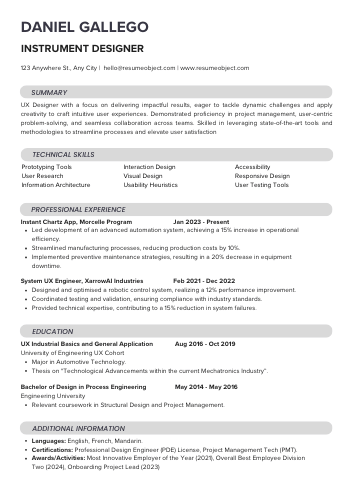
Instrument Designer Resume
Objective
Detail-oriented Instrument Designer with 5+ years of experience in designing and implementing instrumentation systems. Seeking to leverage technical expertise and innovative solutions to enhance project efficiency and drive success.
Summary/Description
Detail-oriented Instrument Designer with 5+ years of experience in designing and implementing instrumentation systems. Proficient in AutoCAD and P&ID development, ensuring compliance with industry standards and enhancing operational efficiency.
Top Required Skills
Proficiency in CAD software
Knowledge of instrumentation standards
Strong analytical skills
Attention to detail
Effective communication skills
Mistakes to Avoid
Failing to highlight relevant technical skills and software proficiency.
Including unrelated work experience that does not showcase design expertise.
Neglecting to quantify achievements and contributions in previous roles.
Important Points to Add
Proficiency in CAD software (e.g., AutoCAD, MicroStation)
Experience with instrumentation design standards and specifications
Strong understanding of control systems and process instrumentation
View More Templates
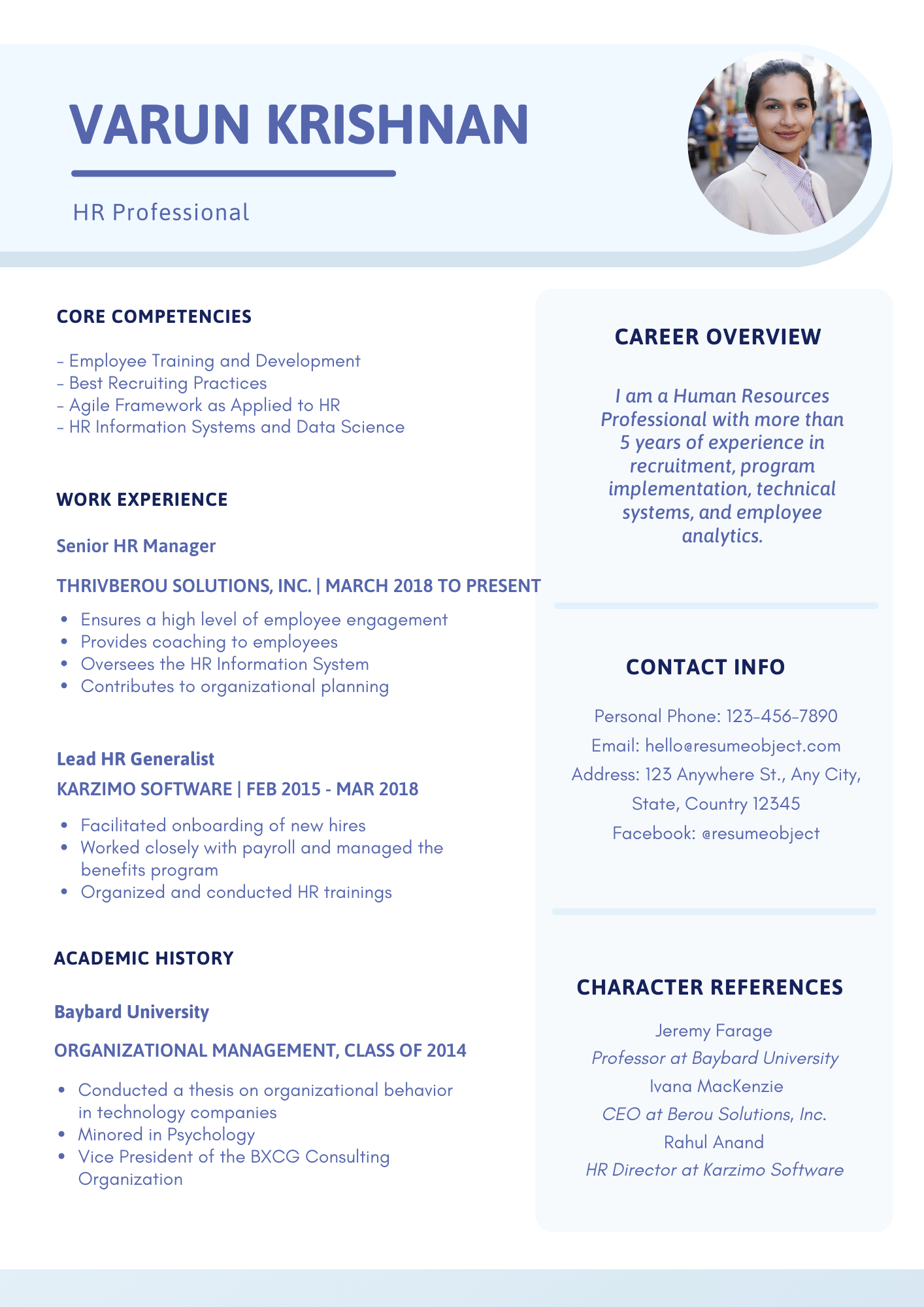 Free Resume Templates
Free Resume Templates

